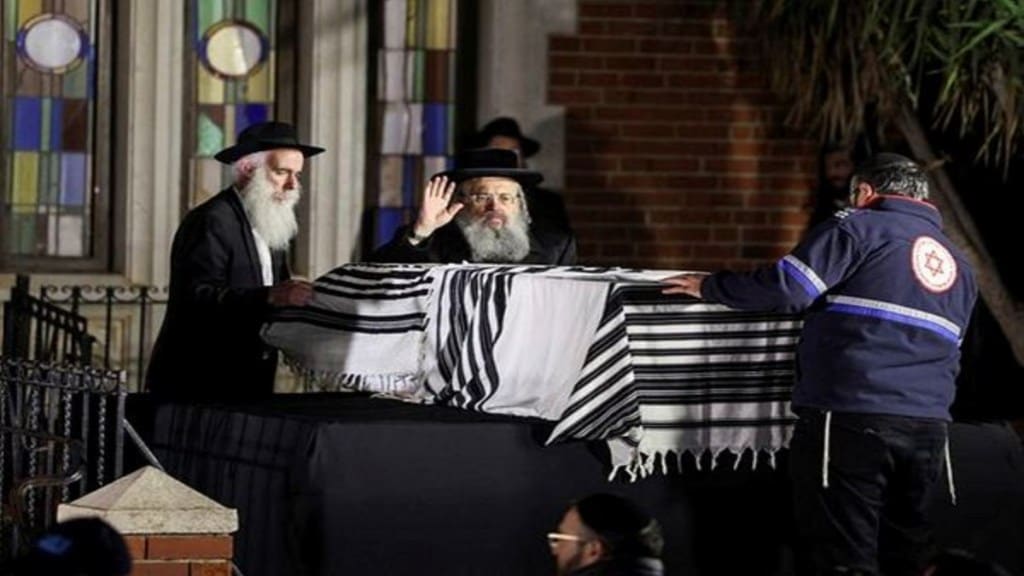On the eve of the 16th anniversary of the 26/11 Mumbai terrorist attacks, the Jewish community worldwide was once again shaken by a tragic event. Rabbi Zvi Kogan, a Chabad emissary based in the UAE, was kidnapped and killed in Dubai under suspicious circumstances. The murder has drawn significant attention due to its connection to the 2008 Mumbai attacks, where Rabbi Gabriel Holtzberg, Kogan’s relative, was also killed in a terrorist assault on Nariman House. The similarities between the two incidents have raised serious concerns about the safety of Jews living in the Middle East and other parts of the world, particularly at a time when tensions with Iran and its allies remain high.
A Deeply Personal Connection to the Mumbai Tragedy
Rabbi Zvi Kogan’s death is a painful reminder of the 26/11 Mumbai attacks, which targeted multiple locations across the city, including Nariman House, where Rabbi Gabriel Holtzberg and his wife, Rivka, were killed by Pakistani terrorists. Rabbi Gabriel, a prominent Chabad leader, was just 28 years old at the time of his death, and his murder sent shockwaves through the Jewish community. Kogan, who was also 28 years old, was married to Rivka’s niece, adding a personal dimension to this new tragedy. The resemblance between the two murders—young rabbis, both involved in outreach and community work, killed in terrorist attacks—has left the family grieving once again.
The parallels between the two events are not just coincidental. In both cases, the victims were deeply committed to their communities. Rabbi Kogan, originally from Moldova, had been active in the Chabad community in the UAE, helping to establish Jewish life and education in the country. His work was part of a broader effort to strengthen ties between Israel and the UAE, which normalized relations under the Abraham Accords in 2020.
The Circumstances of Rabbi Kogan’s Death
Rabbi Kogan was reported missing from Dubai last week on Thursday. After a few days of investigation, his body was discovered in Al Ain, a city about 150 kilometers from Abu Dhabi. UAE authorities, along with Israeli intelligence agencies, quickly launched a search operation. The discovery of Kogan’s abandoned car in Al Ain, along with signs of a struggle, raised suspicions that the killing was not random but targeted.
Israeli authorities have expressed concern that Iran may have played a role in orchestrating the attack, pointing to the involvement of Uzbek nationals who may have been recruited by Iranian operatives. The suspects, believed to have fled to Turkey, have raised further suspicions about the involvement of Iranian-backed groups. While Iran has denied any involvement, the allegations have added to the tense geopolitical environment surrounding the murder.
Israel’s Response and the Impact on Jewish Communities
Israeli Prime Minister Benjamin Netanyahu condemned the murder as an anti-Semitic terrorist attack, vowing that Israel would take all necessary steps to bring those responsible to justice. He also acknowledged the UAE’s cooperation in the investigation, while stressing the need to confront the “Axis of Evil,” a term frequently used to refer to Iran and its allies.
The killing of Rabbi Kogan has intensified concerns about the safety of Jewish religious leaders and communities in the Middle East. Israel has been increasingly focused on countering threats from groups like Hamas and Hezbollah, as well as from Iran, which has been accused of sponsoring terrorism in the region. The murder of Kogan underscores the vulnerability of Jews living in countries with significant geopolitical tensions, particularly those who are seen as symbols of Israeli influence.
In the UAE, where relations with Israel have improved in recent years, the incident is particularly unsettling. The murder has prompted the Jewish community to question the security of its members, especially as Israel and the UAE work to strengthen their ties. Rabbi Kogan had been an important figure in establishing Jewish institutions in the UAE, including a Jewish education center, and his death has left many in the community mourning his loss.
Family’s Reaction: A Recurrent Tragedy
For Kogan’s family, the murder has brought back painful memories of the Mumbai attack. They have expressed deep sorrow over the tragic and almost identical nature of the two killings. “We feel that the same tragedy has happened again,” said a family member, highlighting the fact that both men were young, both were rabbis, and both were involved in the Chabad movement. The timing of Kogan’s death, just one week before the global Chabad emissaries’ conference, further deepens the sense of déjà vu.

